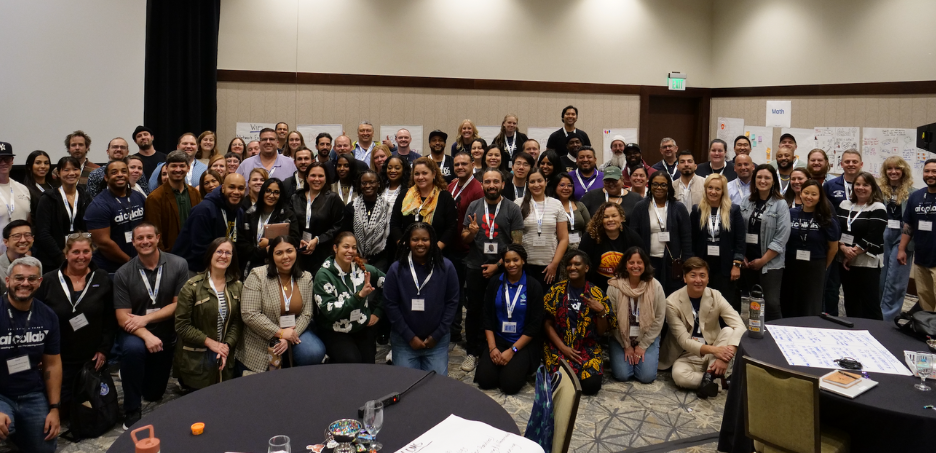The rapid rise of artificial intelligence (AI) is generating powerful new applications permeating countless sectors and industries. Yet, while AI has massive potential to impact education, translating AI’s promise into instructional practices remains an ambiguous, complex challenge.
To address this, Leading Educators and The Learning Accelerator have launched the School Teams AI Collaborative, bringing together educators from across the country to build knowledge, experiment together, and surface promising AI-enabled instructional practices.

Powerful Applications of AI in Other Sectors
AI has already made a significant impact in several sectors.
- In medicine, scientists at the Harvard Medical School have developed AI tools that significantly outperform existing practices in detecting cancer and predicting a tumor’s behavior, enabling more accurate, personalized treatment plans.
- Researchers have been using AI to analyze animal vocalizations, pushing the boundaries of interspecies communication; in this field, a recent study even suggests that elephants communicate with one another using unique “names,” comparable to human identifiers.
Given these advancements, it’s no surprise that AI has sparked excitement in education. Enthusiasts envision a future of fully personalized learning, where students receive instruction tailored precisely to their strengths, interests, and areas for development. Generative AI could also alleviate workloads for an already stretched teaching force, handling tasks like lesson planning, grading, and administrative work (e.g., creating more flexible schedules).
Tensions in AI’s Potential
Yet, significant concerns exist. Biases in AI algorithms have shown discriminatory effects in various fields, affecting groups positioned furthest from opportunity and raising ethical issues around fairness and privacy. In education, there’s a fear that over-reliance on AI could turn students into passive instruction recipients rather than active participants in learning. Concerns also surround the environmental impact of AI and the potential displacement of teachers as AI-driven systems evolve.
These tensions create a polarized view of AI’s role in education. The problem with both utopian and dystopian narratives, however, is that they tend to leave the major actors – in this case, educators and students – out of the equation, failing to acknowledge the ways in which they can shape AI’s role in their lives.
The problem with both utopian and dystopian narratives, however, is that they tend to leave the major actors – in this case, educators and students – out of the equation, failing to acknowledge the ways in which they can shape AI’s role in their lives.
Putting Teachers in the Driver’s Seat
So, who better to help navigate these tensions than educators themselves, those most connected to the challenges and opportunities? The School Teams AI Collaborative puts educators in the driver’s seat, bringing together 80 educators from 19 schools across the country to explore, test, and share best practices for using AI in ways that support real instructional improvement and better student outcomes.
Last month, the Collaborative held its first gathering in Denver, where over three days, educators shared their early experiences along with strategies they have found successful, brainstorming solutions to common challenges. Among the many ideas discussed, educators:
- Shared ways to use AI to differentiate instruction for specific student populations, such as those with IEPs or multilingual learners
- Debated how to have students use AI in ways that set students up to do the majority of the cognitive lift
- Explored project-based uses of AI that encourage real-world applications and problem-solving
Throughout this school year, these trailblazing educators will implement AI-enhanced strategies in their classrooms. By sharing their findings, the Collaborative aims to build a foundation of promising practices that other educators can adopt, ensuring AI’s impact is driven by those who know classrooms best. In an upcoming blog post, we will spotlight AI-enabled strategies from three Collaborative educators.
Learning from the Past: Edtech’s History
The excitement around AI recalls the promises of past edtech innovations. Educational technology (edtech) has a long history of overpromising and under-delivering, with mixed results from tools like interactive whiteboards, 1:1 device programs, and learning management systems. Even technologies with proven benefits have struggled in classrooms due to inadequate training (for both educators and students), limited support, or a lack of alignment with instructional goals. Too often, technology is introduced as an end in itself rather than a means to support a larger vision of teaching and learning.
We hold multiple truths about AI: it could indeed be transformative, saving teachers valuable time and opening new avenues for student engagement, but if it merely sustains the status quo, it risks being just another tool in a long line of overhyped edtech. To realize the potential of AI, it must be implemented thoughtfully, grounded in evidence-based practices, and used to empower educators and students – not simply automate or supplant their roles.
Applications are currently closed for the 2024-2025 school year, but we welcome any questions or other ways you want to stay connected. Email: partnerships@learningaccelerator.org to get in touch.

